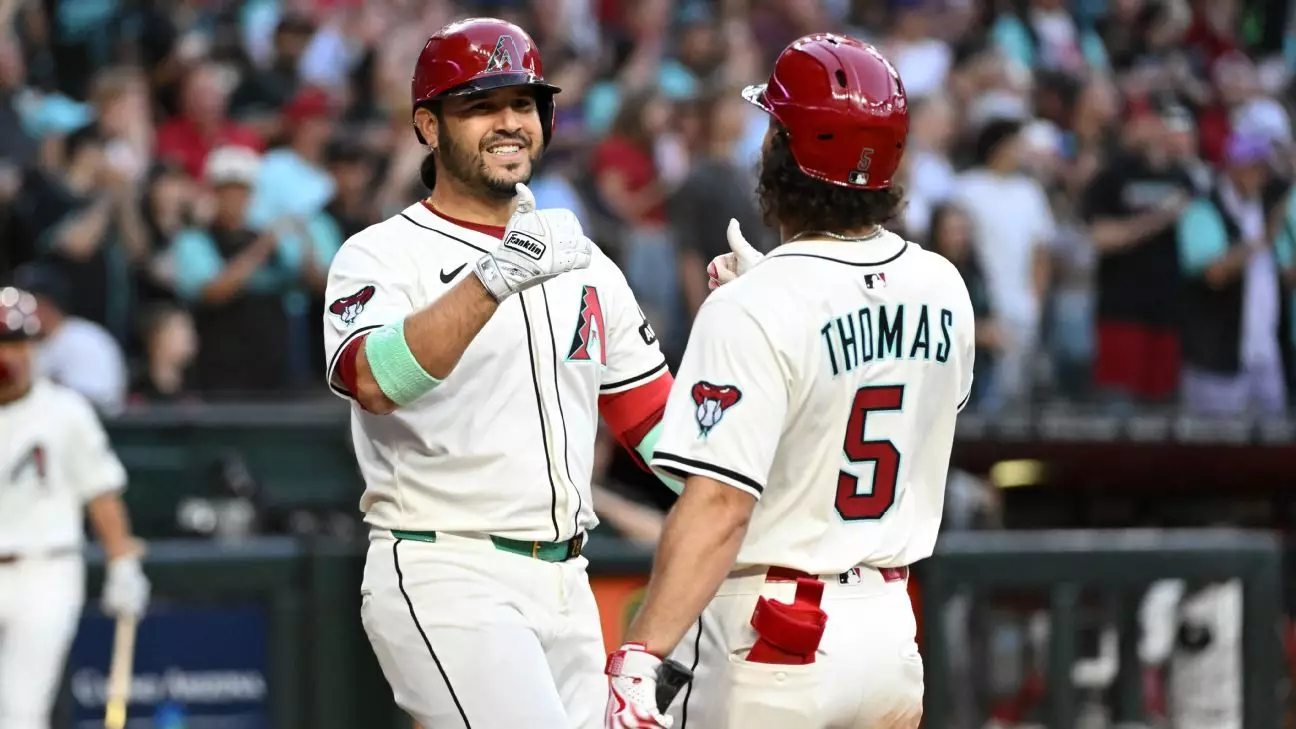In the realm of baseball, moments can oscillate between sheer exhilaration and heart-wrenching disappointment in the blink of an eye. For Arizona Diamondbacks’ third baseman Eugenio Suárez, a recent game against the Atlanta Braves encapsulated this duality perfectly. On a night when he etched his name into the annals of MLB history, becoming only the 19th player to achieve the remarkable feat of hitting four home runs in a single game, the victory remained tantalizingly out of reach as the Diamondbacks fell 8-7 in extra innings. This situation raises intriguing questions about the nature of success and failure in professional sports, particularly in an unforgiving environment where individual brilliance can be overshadowed by collective shortcomings.
Suárez’s achievement feels nothing short of magical. As he stepped onto the field batting a dismal .167 with only six homers and 15 RBIs to his name, few could have anticipated that he would transform the course of his season in such a dramatic fashion. With every swing, he added to the aura of possibility surrounding his game, culminating in a performance that left fans and teammates alike in disbelief. “When does that happen?” exclaimed D-backs manager Torey Lovullo, an assertion that resonates with any ardent lover of the sport. Such moments are rare and precious, yet they also highlight the fragility of athletic success, a paradox that defines professional sports.
The Heart of the Game: Mixing Joy with Despair
Yet, as awe-inspiring as Suárez’s achievement was, the bitter aftertaste of defeat loomed large. Despite his extraordinary night, the game ended in heartache for the Diamondbacks. Suárez himself acknowledged the conflicted emotions haunting him as he basked in the glory of his own performance while grappling with the disappointment of a team loss, saying, “Mixed feelings right now because we didn’t win the game.” This encapsulates a core truth in the world of sports: the thrill of individual accolades can be overshadowed by the collective goal of team success.
It’s a narrative that resonates with sports fans everywhere— the agony of seeing one’s personal hero shine while the collective effort falters. Suárez, a seasoned veteran with a storied career, reflects the essence of resilience that baseball embodies. He may have struck deep into the heart of performance excellence, but it’s also important to remain grounded in the context of the larger game. The unpredictability of a sports season can leave even the most skilled athletes feeling vulnerable to the whims of chance and circumstances beyond their control.
The Peculiarities of a Historic Night
Adding another layer of intrigue to the story, Suárez’s four-home-run night serves as a reminder of the fine line between triumph and tragedy inherent in professional sports. Representing only the second occasion in MLB history where a player accomplished this feat while still ending up on the losing side, he stands shoulder to shoulder with Braves’ player Bob Horner from 1986. Such moments raise profound questions about how we define success and whether personal accolades can ever truly compensate for team failures.
Moreover, Suárez’s night produces a vivid backdrop against which to reflect upon potential reforms in how the game’s significance is perceived. Perhaps the league, fans, and players alike should reconsider prioritizing team achievements over individual milestones. After all, the fabric of sportsmanship lies in teamwork and collective resilience. As the cries of 43,000 fans rang through Chase Field in response to Suárez’s astonishing feats, it serves as a poignant reminder that while individual heroics should be celebrated, they should never eclipse the team’s struggle as a cohesive unit.
As we celebrate Suárez’s extraordinary achievement, we must recognize the bittersweet undercurrents of his performance. As both players and fans navigate the ever-turbulent waters of competition, it’s essential to strike a balance between personal glory and the critical importance of team unity. In baseball, as in life, the lessons learned from losses, as much as victories, shape the narrative that defines us. The challenge now lies in how we approach the next game, hungry for both personal brilliance and team triumph—a quest as elusive as it is rewarding.


Leave a Reply